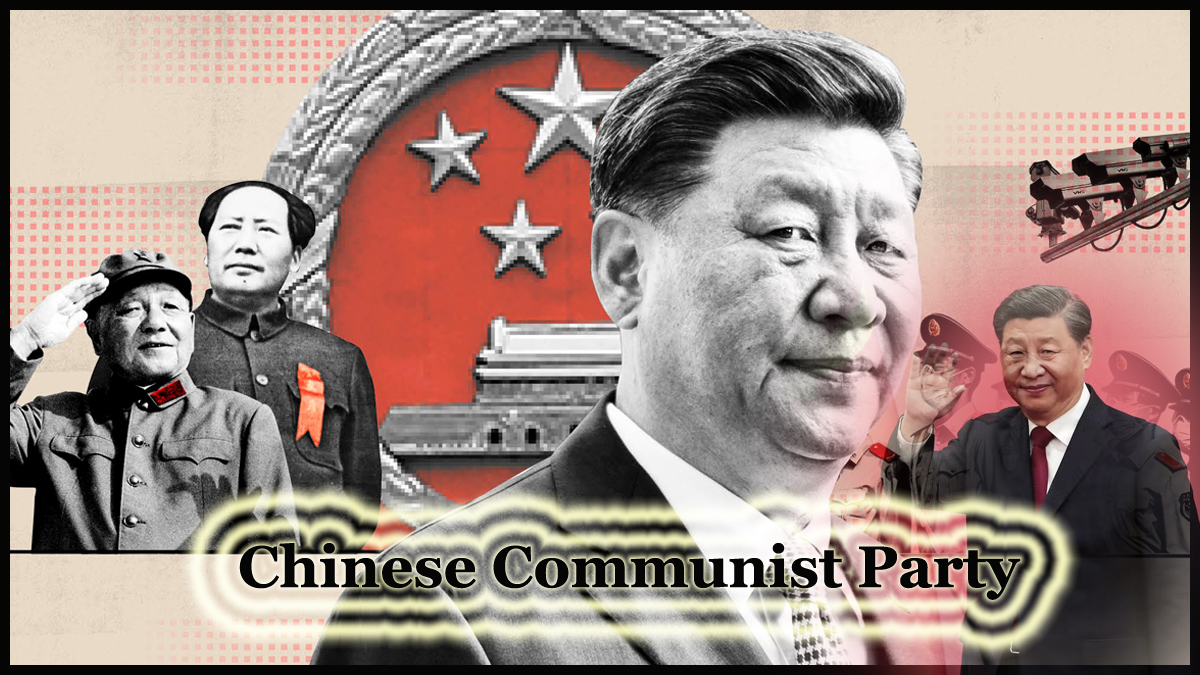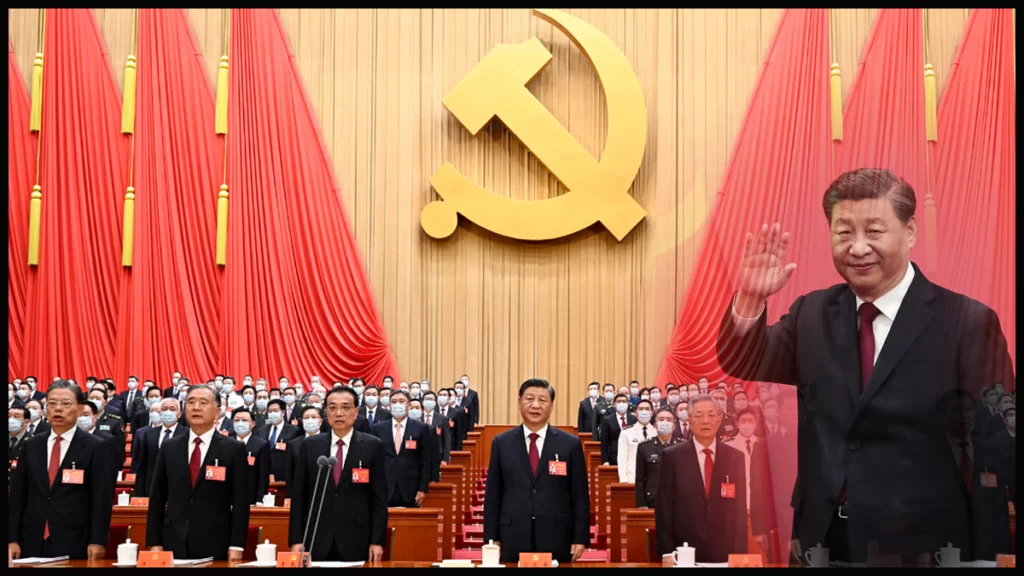
The Chinese Communist Party (CCP) is the ruling political party of the People’s Republic of China (PRC). It was founded in 1921 and has been in power since 1949, when it established the PRC after winning the Chinese Civil War.
Here are some key facts and information about the CCP:
Ideology: The CCP is a Marxist-Leninist party that believes in socialism with Chinese characteristics. It emphasizes the importance of the collective over the individual and seeks to build a socialist society through a combination of state planning and market-oriented reforms.
Leadership: The CCP is led by a General Secretary, who is currently Xi Jinping. There are also several other top leaders who make up the Politburo Standing Committee, which is the highest decision-making body in the party.

Membership: The CCP has over 95 million members, making it the largest political party in the world. Members are required to follow the party’s ideology and discipline, and are subject to strict selection and vetting processes.
Governance
Governance: The CCP controls all levels of government in China, from the national to the local level. It also controls the military, police, and judiciary.
Economy: The CCP has overseen China’s economic transformation from a largely agrarian society to a global economic power. It has implemented market-oriented reforms while maintaining strict state control over strategic sectors such as finance, energy, and telecommunications.
Human rights: The CCP has been criticized for its human rights record, including restrictions on freedom of speech and the press, suppression of religious and ethnic minorities, and crackdowns on dissidents and civil society groups. It has also been accused of engaging in widespread surveillance and censorship.
Foreign policy: The CCP has pursued a policy of “peaceful rise” or “peaceful development” in its international relations, emphasizing cooperation and non-interference in other countries’ internal affairs. However, it has also been criticized for its assertive behavior in the South China Sea and for its treatment of Hong Kong and Taiwan.
Overall, the CCP is a powerful and influential political party that has had a profound impact on China’s development and global standing. Its policies and actions continue to be closely watched and debated both within China and around the world.
Here are some additional points about the Chinese Communist Party:
History: The CCP was founded in Shanghai in 1921 by a group of intellectuals who were inspired by Marxist ideology. It initially struggled to gain a foothold in China’s fragmented political landscape. But it gained momentum in the 1930s through its military and political campaigns against the ruling Nationalist Party.
Mao Zedong: Mao Zedong was the founding father of the People’s Republic of China. And the leader of the CCP from 1949 until his death in 1976. He is remembered for his role in establishing the PRC and for his radical policies during the Cultural Revolution. Also which included the suppression of intellectuals, the persecution of political opponents, and the destruction of traditional Chinese culture.
Deng Xiaoping: Deng Xiaoping succeeded Mao as the leader of the CCP in 1978. And is credited with initiating China’s economic reforms. Under Deng’s leadership, the CCP implemented a series of market-oriented policies that led to rapid economic growth. And the emergence of a middle class in China.
Xi Jinping
Xi Jinping: Xi Jinping has been the General Secretary of the CCP since 2012. And the President of China since 2013. He has emphasized the importance of the CCP’s leadership in all aspects of Chinese society. And has pursued an ambitious agenda of domestic reform and international expansion.
Social Credit System: The CCP has implemented a “social credit system” that uses big data and artificial intelligence to monitor. And evaluate the behavior of individuals and businesses. The system assigns scores based on factors such as financial responsibility, social behavior. And political loyalty, and can be used to reward or punish individuals.
Belt and Road Initiative: The Belt and Road Initiative is a major foreign policy initiative of the CCP that seeks to promote economic development. And connectivity across Asia, Europe, and Africa. The initiative involves massive infrastructure projects such as ports, railways. And highways, and has been criticized for its potential to deepen China’s economic and political influence in the region.
COVID-19 pandemic: The CCP has been criticized for its handling of the COVID-19 pandemic. Also including its initial cover-up of the outbreak in Wuhan. And its censorship of information about the virus, and its use of coercive measures to control the spread of the virus. However, China has also been praised for its rapid and effective response to the pandemic. Also including its production and distribution of vaccines.
These are just a few additional points about the Chinese Communist Party. But they illustrate the wide-ranging impact that the CCP has had on China and the world.
Here are some more points about the Chinese Communist Party:
The Party’s influence in society: The CCP’s influence is pervasive in Chinese society and extends beyond just politics. It controls major media outlets, including newspapers and television stations, and has a strong presence in education and cultural institutions. It also has a powerful role in the business world, with many state-owned enterprises under the direct control of the Party.
Corruption crackdown: In recent years, the CCP has launched a high-profile anti-corruption campaign. And targeting officials at all levels of government and the Party. The campaign has been popular with many Chinese citizens who see corruption as a major problem. But critics argue that it has also been used to eliminate political rivals and consolidate power.
Hong Kong and Taiwan: The CCP’s policies towards Hong Kong and Taiwan have been a major source of controversy. The Party has sought to increase its control over Hong Kong, leading to widespread protests in 2019 and 2020. It also claims Taiwan as part of its territory and has taken a hardline stance towards the island. Also including military exercises and diplomatic pressure.
Ethnic minorities
Ethnic minorities: The CCP’s treatment of ethnic minorities, particularly Uyghurs. And other Muslim groups in Xinjiang province, has been widely criticized. The Party has been accused of carrying out a campaign of mass detention and forced labor. And as well as cultural and religious repression.
Socialism with Chinese characteristics: The CCP’s ideology of socialism with Chinese characteristics emphasizes the importance of adapting Marxist theory to the specific conditions of China’s history and culture. This has included a focus on economic development and modernization. And as well as a strong emphasis on national unity and sovereignty.
Military power: The CCP has invested heavily in building up China’s military capabilities. Also including the development of advanced weaponry and the modernization of the People’s Liberation Army. This has raised concerns among China’s neighbors and the international community about the country’s territorial ambitions and intentions.
These additional points further highlight the complexity and influence of the Chinese Communist Party on China and the world.
Here are some more points about the Chinese Communist Party:
One-Party rule: The CCP is the only legal political party in China and has a Monopoly on political power. This has led to concerns about the lack of political Pluralism and freedom of expression in China.
Internet Censorship: The CCP exercises strict control over the internet in China. Also with a vast network of censors and filters used to block access to foreign Websites and to control online speech. Popular social media Platforms such as Facebook, Twitter. And Google are blocked in China, and Domestic Platforms are subject to Extensive Censorship.
Economic power: China is the world’s Second-Largest economy and has become a major player in global trade and investment. The CCP’s Economic Policies, including its Emphasis on State-Owned Enterprises and Industrial policy. And have been a key factor in China’s Economic growth.
Also Read – Top10 University for Law Degree
Environmental challenges
Environmental challenges: China faces significant Environmental challenges, including air and water Pollution, Deforestation, and soil Degradation. The CCP has made efforts to address these issues, including Launching a “war on Pollution” and Investing in Renewable energy. However, the Party’s Emphasis on Economic growth and development has sometimes come at the expense of Environmental protection.
Also Read – Why Nathuram Godse killed Mahatma Gandhi
Demographic challenges: China’s population is aging rapidly, with a Declining Birthrate and an Increasing elderly population. This presents significant challenges for the CCP’s Economic and social Policies. Also including the Sustainability of the Country’s pension and Healthcare systems.
Space Exploration: China has made significant advances in space Exploration. Also including Launching its own space station and landing a rover on the far side of the moon. The CCP sees space Exploration as a key Component of its national development strategy.
These Additional points Illustrate the Wide-Ranging impact that the Chinese Communist Party has on China and the world. And the complex challenges that the Party faces as it seeks to maintain its grip on power and pursue its goals.
Also Read – What is the Gastrointestinal system?

One thought on “All about Chinese Communist Party”